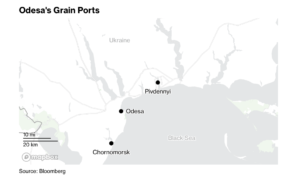As a result of the attack on Iran, nitrogen fertilizer at the port of New Orleans has seen an increase in price this week. Urea prices for barges in New…
Four Vessels Move Grain and Metals Through Black Sea “Humanitarian Corridor” on Friday
Reuters writer Pavel Polityuk reported late last week that, “Four vessels left Ukrainian Black Sea ports in the Odesa region on Friday as shipping via a new export corridor resumed after a three-day pause, independent transport sector consultancy STC said.
‘On October 27, vessel traffic in the temporary Black Sea corridor announced by Ukraine resumed,’ STC said in a report.
“It said the Propus, Iasos, Gloria G and Manassa Queen had sailed from Odesa ports while the tanker Mavka, bulk carrier Golden Arrow and general cargo vessel Maranta were currently heading to Ukrainian ports.”
#Ukrainian_corridor: 4 ships are moving in the direction of the Bosphorus, 11 ships have entered the ports of Big Odesa for loading.
— Oleksandr Kubrakov (@OlKubrakov) October 27, 2023
Today 4 bulk carriers exported almost 130K tons of grain and 10K tons of metal to countries in Africa, Asia, and Europe. The ships left the ports… pic.twitter.com/lo2wW4LPnN
The Reuters article indicted that, “On Thursday, the Kyiv-based Barva Invest consultancy, British security firm Ambrey and a specialised outlet, Ukrainian Ports, reported that Ukraine had suspended use of the corridor due to a possible threat from Russian warplanes and sea mines.
“Ukrainian officials denied this and President Volodymyr Zelenskiy said on Friday the corridor would continue to function despite threats.
“Ukraine has been using the corridor to try to revive its seaborne exports, defying threats from Moscow which quit a U.N.-brokered deal in July that had allowed some food exports to flow despite the war.”

Dow Jones writer Kirk Maltais reported on Friday that, “A back-and-forth over the status of the Black Sea shipping corridor continues, which pressured wheat Friday.
“‘Vessel maps do show movement at/near Odesa and along the Danube,’ said AgResource in a note.
“On Thursday, there were reports that Ukraine stopped operations in port cities because of Russian military threats, but the Ukrainian government disputed those reports.”
The Black Sea humanitarian corridor remains open. 37 ships have passed through, and counting. Freedom of movement and open trade on the Black Sea is essential to the world. pic.twitter.com/5RCto8ATW8
— Ambassador Bridget A. Brink (@USAmbKyiv) October 27, 2023
And Bloomberg writers Volodymyr Verbyany and Aine Quinn reported on Friday that, “Ukraine is imposing tighter controls over grain traders to boost revenues to fund its wartime defenses, a move that may further complicate shipments from the country’s Danube and Black Sea ports.
“The Cabinet of Ministers will require exporters of grains and oilseeds either to get licenses or to provide tax records going back before the invasion, an official with knowledge of the matter said, asking not to be identified to discuss decrees passed at a government meeting on Friday. The mechanism may be amended further, should the situation change, the official said.
“The government aims to squeeze out fly-by-night companies, repatriate more foreign currency revenue and raise tax collection as Ukraine’s international allies, which are providing billions of dollars of aid, scrutinize its anti-corruption efforts. However, the efforts are taking time and costs for traders are racking up as their cargoes suffer delays.”
The article explained that, “The bureaucracy, along with delays due to overcrowding of the channel, bad weather and de-mining operations means it’s taking almost twice as long as usual for ships to start loading, according to the trader. One of his ships has been waiting 11 days to berth in Ukraine’s riverport of Reni, while a second has been waiting 14 days to get clearance to pass the Sulina channel and pick up its cargo in Izmail and each day of delays can cost as much as $4,000 extra in demurrage costs, he said.”





